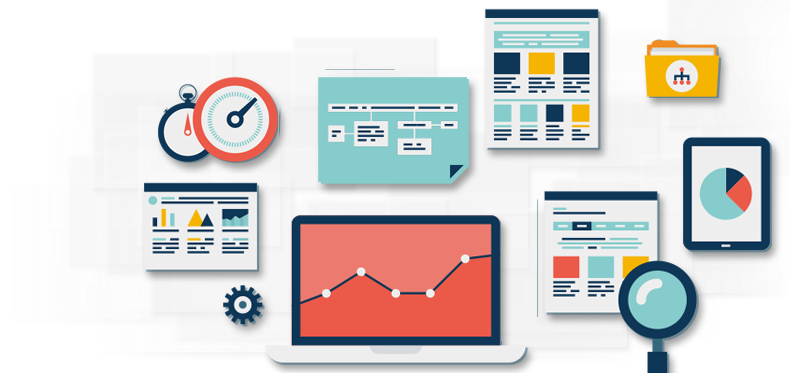The Top 8 Reasons Why You Should Convert Your Desktop App to a Web App
4 min read
Topic:
Legacy System Modernization
One of the most important things to understand about the modern customer is that, by and large, they expect all applications to be either web-based or fully mobile. This makes sense, given both the prevalence of people working from home and the nearly ubiquitous nature that smartphones have achieved in our lives over the last decade. People need anytime, anywhere access to critical information, and they want the apps that they use to provide it - which is problematic if you're still relying on older, legacy applications that offer absolutely none of the above.
Web App vs Desktop App: What You Need to Know
The key factor to remember about desktop apps is that most of them were originally designed for one user on a single computer before anyone even cared about data sharing in any way, shape or form. A small business in the early 1990s probably only had one computer - if it were lucky enough to have one at all. Everything was stored locally, and that was perfectly okay - because that was simply the best that modern technology had to offer at the time.
Even when data sharing did become something that was even possible, it happened entirely across a local area network (LAN). This, too, was more than acceptable because it still represented a major step forward from "the way things used to be."
With the advent of the Internet and with broadband Internet connections being in nearly every home and business across the country, more and more applications moved online - but those legacy applications were simply never designed to run this way. On the one hand, this isn't necessarily anybody's fault - they were put out into the world during a time when the types of modern requirements that today's users expect simply weren't possible. But at a certain point, businesses stopped making that "major step forward from the way things used to be" - and their productivity dramatically suffered as a result.
The major reason why companies are moving their applications to the web is not only to support a distributed workforce (something that the COVID-19 pandemic has shown us is critically important), but to also be able to directly connect with their customers. A successful organization these days needs to be in a position to accomplish both of these things at the same time, and if they're still relying on antiquated technology like legacy applications... they can't.
Truly, it doesn't get much more straightforward than that.
The Advantages of Web Applications - 8 Reasons Why You Should Convert Now
Thankfully, capitalizing on the opportunity to convert desktop apps to web apps brings with it a host of unique advantages, all at the exact same time.
- No software installation. For starters, gone are the days when you needed to manually install a piece of software on every machine your employees use. There's not actually any need to install anything at all, as so long as the user has a web browser, they can access the application from any location. This means that literally any device that is connected to the web becomes their "work device," enabling them to be every bit as productive halfway around the world while traveling as they could be in the comfort of their own office.
- Automatic updates. Likewise, you don't have to worry about remembering to update those apps since updates are performed automatically. Code changes happen on the web server, not on your computer - meaning that users do not need to install the updated version of an application as they're always working with the latest release by default.
- Cross-platform compatibility. Cross-platform availability is also a major benefit of web applications, as there is no specific code required that depends on an operating system or a particular piece of hardware. To that end, not only can this allow you to avoid a lot of the incompatibility issues that plague legacy desktop applications, but it also helps you extract even more value from your existing hardware as well.
- Light on system resources. This also means that those web-based applications are very light on computer resources, since all of the "heavy lifting" is done on an enterprise-class web server and database system, or in a cloud-based system that includes multiple servers. So you can still continue to use the hardware that you've always used without needing to upgrade to something "newer and faster" every year or two. This, too, goes a long way towards improving the ultimate return on investment of your IT infrastructure - all without limiting the productivity of your employees in any way.
- 24/7 access to data. By their nature, web-based applications also offer mobile access 24 hours a day, seven days a week, 365 days a year since all mobile devices have the ability to access websites natively. So, you don't have to worry about any custom code or development of any kind just to bring your app up-to-speed with the latest smartphone releases on an annual basis.
- Better user interfaces. But more than anything, remember that most desktop applications were written long ago - in an era where user interface expectations were vastly different than they are now. Modern web applications support that feeling and experience that modern users have grown accustomed to. In an era of web-based applications, programs are far more sleek and sophisticated - the user experience has been streamlined in a way that allows you to improve your application in a way that produces higher productivity of both your staff and your clients.
- Potential for Integration. Web applications also allow you to do things that would be unthinkable in a desktop application - such as integrate to other external systems with ease. Say one of your clients was using a third party application like QuickBooks, for example. If you wanted to include client input and were still working with an "old school" (to put it politely) desktop application, it would be nearly impossible. Building a web client portal, however, is commonplace with web applications.
- Scalability. Finally, web applications are inherently more scalable than desktop alternatives - meaning that they can continue to grow and evolve as your business does the same. This, coupled with the fact that they're more than equipped to support multiple users at the same time, is perhaps the most important advantage of all for many businesses. The fact that users have a consistent and equal view of all enterprise data doesn't just put everyone on the same page - it enables better and more forward-thinking decision-making as well.
In the end, businesses have now come to the conclusion that by migrating their desktop applications to web applications, they can take advantage of greater flexibility and far higher productivity levels in terms of their workforce. Not only can this help benefit your organization in terms of immediate performance boosts, but it can also help create the type of competitive advantage that will serve you (and your clients) well for years to come. If you needed just a single reason to finally make the investment to convert that old desktop app to a web app, let it be that one.
To learn more about why you should convert your desktop app to a web app, please download our eBook titled "Legacy System Modernization 101 - Your Guide for Success."


